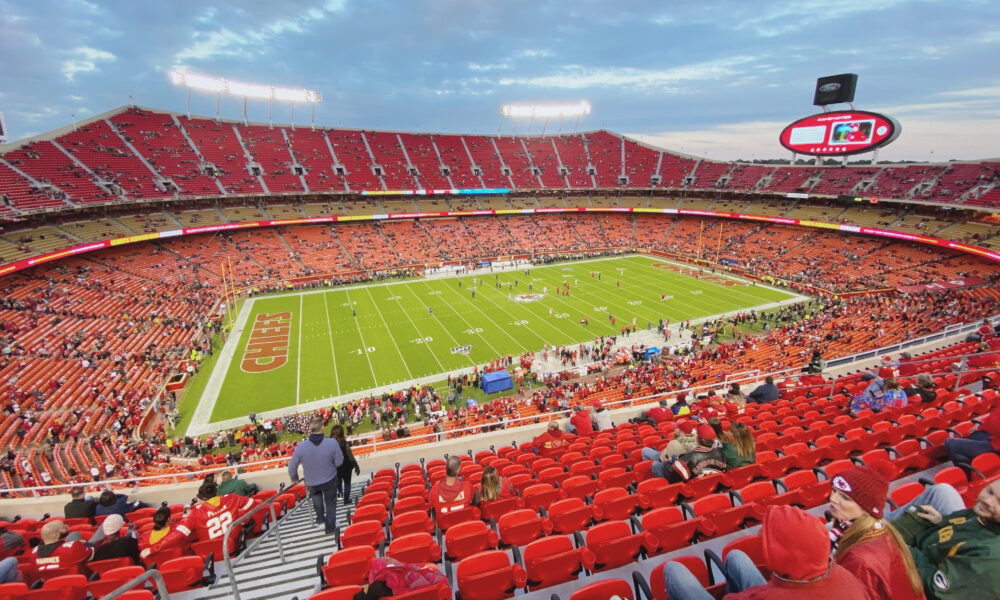The Super Bowl is 2024’s biggest marketing event. As the most watched U.S. program ever, each image shown influences droves of North Americans. Luckily, the Kansas City Chiefs avoided propagating racism. Sure, their name, history, and mascot are all offensive, but that’s not what they stand for! In fact, they’ve proven it, by writing “End Racism” in the end zone, above the insignia of their (racist) team name. In viewing the Super Bowl last weekend, it was not a sweaty Usher on roller-skates nor the mistaken decision to receive by the 49ers in overtime but the glaring insincerity that stood out most. The hypocrisy of the Chiefs’ team name and their attempt to prove their anti-racist sentiments demonstrate the severity of their performative activism.
What is the problem with the name “Kansas City Chiefs”? The name ‘Chiefs’ originates from a white man who appropriated and impersonated Native American culture. Harold Roe Bartle, the eventual mayor of Kansas City, Missouri, was a member of the Boy Scouts program where he went by the nickname “Chief Lone Bear”, claiming that the local Arapaho nation welcomed him, although they did not. Ultimately, when selecting a new name for the former Dallas Texans when they relocated to Kansas City, the Chiefs was officially chosen in 1963 making it the most recent team to adopt a name or logo that referenced Native Americans.
Quickly, the “Tomahawk chop,” an arm gesture along with a singing chant, became a popular cheer. As well, fans adopted Indigenous non-traditional headdresses, regalia, and face paint to support the team. Until 2021, the games began with a horse named ‘Warpaint’ galloping in, ridden by a cheerleader playing an Indigenous-style drum beat.
The team has superficially attempted to move away from their racist practices, but only through performative activism. In 2014, Kansas City created guidelines with local Indigenous groups for fans to follow. Though the chop, along with other references or appropriations of Native American culture, were banned before the 2020 season, many fans elected not to abide by this.
These actions proved to be nothing more than performative. If this fixes everything, then why were masses of Americans gathered, cheering to “stop the chop” and “change the name”? A true dedication to ending racism would be listening to the decades-long calls from local Indigenous groups, like Not in Our Honor to change their name, and through this, team culture. A 2005 study from the American Psychological Association wrote that “mascots based on stereotypes had a harmful effect on the social identity development and self-esteem of young [Native American] people.” Writing “End Racism” does not tangibly help Indigenous peoples in the Americas. The participation in racist practices, both in the stands and of fans at home, is what matters.
Although it took years of activism, McGill serves as an example for Kansas City. A 2018 report by a McGill Task Force on Indigenous Studies and Education recommended that McGill change its team name. Many student mobilizations also pushed for change, and in 2019, McGill became the Redbirds. 2020’s Arts Valedictorian Tomas Jirousek, one of the few Indigenous valedictorians in McGill’s history, was critical in raising awareness and speaking out against this injustice. Showing that McGill would commit to redress their Indigenous appropriation, this spurred some relief and hope for more reconciliation efforts in the future. At the beginning of the regular season in 2020, Kansas City wrote “End Racism” in their end zone. As the Black Lives Matter movement was at its heights, the team took it upon themselves to do the most American thing possible: Act performatively. Kansas City must listen to the demands of Indigenous peoples and change their culture of Indigenous appropriation. Writing “End Racism” is not enough to do that. While the NFL continues to have a long way to go in a number of respects, a name change for Kansas City is the first step to combatting the practices of a racist league.









